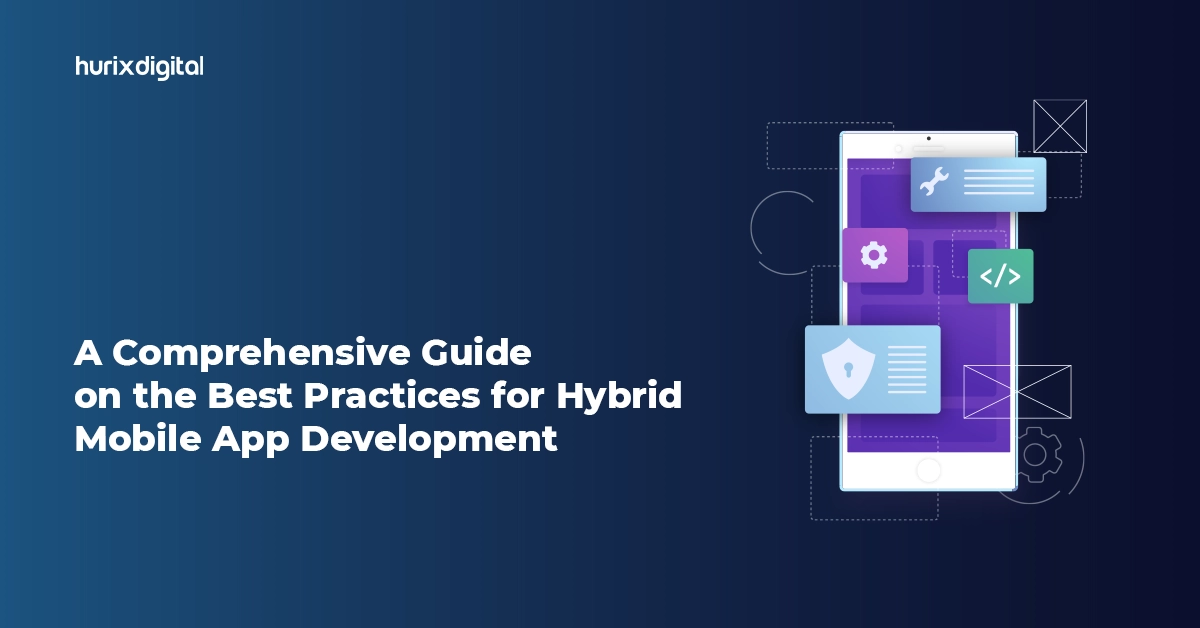A Comprehensive Guide on the Best Practices for Hybrid Mobile App Development
As the number of mobile phone users continues to surge, the need for businesses to create mobile applications becomes increasingly evident. One of the major factors companies need to consider while building mobile applications is choosing between native or hybrid mobile app development approaches.
While each method comes with its own set of benefits and limitations, hybrid applications are gaining traction due to their cost-effectiveness, accelerated time-to-market, and versatility. A Forbes study revealed that 37 of the Top 50 retail apps in the US are hybrid. Additionally, tech giants like Twitter, Instagram, Gmail, and Uber have embraced hybrid app solutions.
This article explores the best practices for hybrid mobile application development, offering insights, strategies, and expert guidance to navigate this evolving landscape effectively. Read on!
Table of Contents:
- What is Hybrid App Development?
- Best Practices for Hybrid Mobile Application Development
- Wrapping Up
What is Hybrid App Development?
Hybrid app development involves building a single app that seamlessly functions across multiple mobile platforms, including Android, iOS, and Windows. This contrasts with the native app development approach, wherein developers leverage platform-specific programming languages to build applications for different operating systems. Put simply, hybrid apps leverage a single code base to function across all operating systems.
To illustrate, building a native iOS application requires proficiency in Swift or Objective-C while developing for the Android OS requires expertise in Kotlin or Java. Conversely, hybrid app development leverages a single codebase, often implemented using technologies such as React Native, Flutter, and Xamarin.
The high demand for hybrid applications stems from their many advantages, including cross-platform compatibility, rapid development cycles, and cost-efficiency.
In a highly competitive business environment, managing development and maintenance costs effectively is crucial. This makes hybrid mobile app development the ultimate solution for building applications.
Also Read: The Key Differences Between iOS and Android App Development
Best Practices for Hybrid Mobile Application Development
To enhance the performance of hybrid apps and deliver a user experience similar to native applications, consider implementing these five best practices for effective hybrid app development:
1. Streamline Your Codebase
To ensure swift loading and peak performance across all platforms, maintain a compact and efficient codebase. Leverage techniques like code concatenation or minification to reduce file sizes, enhancing load times and overall responsiveness.
Tools such as jscompress.com or cssminifier.com can help minify HTML, CSS, and JavaScript files. Remember, minifying your code also involves linting, thereby adding an extra layer of security against potential malicious activities. This will help you create a more efficient and responsive hybrid mobile application.
2. Optimize User Interface (UI)
A well-crafted UI design greatly enhances app performance. While visually appealing elements like rich animations, immersive graphics, and elaborate designs enhance aesthetic appeal, they can compromise app speed and responsiveness.
When leveraging JavaScript and CSS, consider adopting a minimalist or flat design approach. In this scenario, you can adopt these actionable steps to simplify the process:
- Implement CSS Sprite Sheets to consolidate images, reducing server requests and bandwidth consumption.
- Eliminate 404 errors for images and avoid scaling images within HTML.
- Utilize appropriately sized images hosted on scalable, distributed platforms like S3.
- Restrict the use of shadows and gradients to improve rendering speed.
- Generate UI components client-side using JavaScript rather than server-side rendering.
- Dynamically manipulate the DOM by inserting or removing views as required.
Also, follow best practices for UI optimization to ensure a smooth and efficient user experience.
3. Leverage Local Caching for Enhanced Performance
Harness the capabilities of hybrid frameworks like Ionic to leverage local storage effectively, optimizing app performance. By storing data locally and utilizing caching mechanisms, you can minimize server interactions and network requests, ensuring rapid data retrieval and seamless user experiences.
Consider preloading essential data, implementing DOM caching strategies, and minimizing browser reflows to enhance app responsiveness and efficiency further.
4. Exercise Caution with External Libraries
While external or third-party libraries simplify many tasks, it’s essential not to overload your codebase with too many. Excessive libraries can compromise app performance, leading to a less-than-optimal user experience.
Additionally, third-party libraries may introduce bugs or compatibility issues. Before integrating any library, conduct thorough testing and validation to ensure reliability and minimize future update disruptions.
Avoid heavyweight libraries like jQuery, and opt for lighter alternatives such as Zapto.js when necessary. Whenever possible, leverage resources and libraries native to your hybrid framework, such as Apache/Cordova plugins, Angular Modules, or Ionic plugins, to enhance performance and reliability.
5. Prioritize End-to-End Automation Testing
Robust testing remains vital in app development, with hybrid apps requiring thorough examination. Assess every aspect, including design, loading speed, and overall performance, to validate the app’s readiness for market deployment.
Employ frameworks like Jasmine, Mocha, and Karma for rigorous JavaScript code unit testing. Utilize tools like Istanbul to execute unit tests across your codebase, while Browser-Perf facilitates performance testing directly within the browser environment.
Additionally, platforms like New Relic enable comprehensive monitoring of critical metrics, ensuring optimal app performance and responsiveness.
Also Read: How IoT Will Impact Your Mobile App Development
Wrapping Up
Hybrid mobile app development offers a streamlined and cost-efficient way to engage a diverse user base across multiple platforms.
While it may not entirely replace native apps in every context, it often strikes a harmonious balance between performance, affordability, and time-to-market for many businesses. So, before starting your hybrid app development journey, assess the benefits and limitations, ensuring a hybrid strategy resonates with your organizational goals.
You can also leverage Hurix Digital’s custom hybrid mobile development services to transform your vision into reality. We’ll work closely with you and ensure your app not only fulfills its intended purpose but also meets all those technical requirements.
Reach out to us today for further insights and consultation!

SVP & Head – Hurix Technology Solutions
Global Delivery head with 25 years of working experience in NYC investment banks and fintech companies. Hands-on technology delivery management and program management, accountable for stakeholder relationships, Strategic roadmap, P&L, Revenue growth, Account Management, and employee satisfaction.









